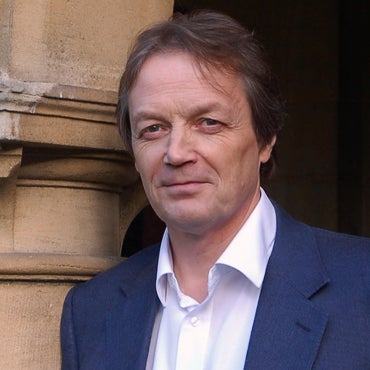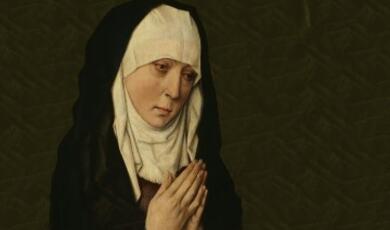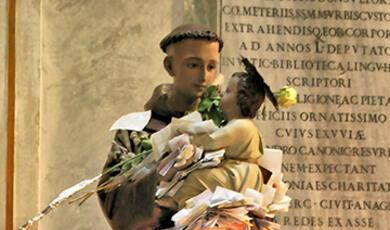The Music of the First Christians
Share
- Details
- Transcript
- Audio
- Downloads
- Extra Reading
Early in the second century a Roman governor interrogated a group of Christians to satisfy himself that they had not offended against his recent edict banning clubs that might acquire a political slant. The Christians told him that they said that they convened before dawn on Sundays, when they were accustomed to sing a hymn of praise, and that they met subsequently to share a common meal. Perhaps to confute the rumour that they and their co-religionists indulged in cannibalism, the prisoners insisted that they ate perfectly innocent food when they gathered. Like many others in the first and second centuries, the governor thought the Christians very strange. So they were in many respects, but they were not so strange that they repudiated the use of ritual song. We begin our survey with the music of the first Christian communities.
Download Transcript
6 October 2016
The Music of the First Christians
Professor Christopher Page
Imagine, if you will, a string quartet playing on stage: violins, a viola and a ‘cello. Let your imagination play over the warm colours and exquisite curves of those instruments: pieces of musical technology that, in some major respects, have not changed for many centuries. Now let the eye of your imagination turn its gaze to the bows. They are so familiar you may perhaps hardly see anything unusual about them. And yet, whenever a string quartet gives a recital, perhaps featuring works that many in the audience regard as masterpieces of Western musical art, the sounds are produced with a basic raw material of the Asian nomad: horsehair. Bows strung with the tails of horses momentarily bring the world of skin-tents and fermented mare’s milk into a surprisingly happy conjunction with Beethoven’s late quartets.
Then perhaps you might glance at the music which the players have on the stands before them. Each one is reading from musical notation on a five-line stave, or is very likely to be doing so unless they are venturing into some very new repertoire indeed. That staff is a legacy from the song schools of the eleventh century, for in its most familiar form, with five parallel lines, it records the octave, with a few extra notes on either side, that medieval singers of plainsong were required to supply. To put it another way, the musical stave we all use bears the imprint of what was needed nearly a thousand years ago.
These two inventions, the musical bow and the staff, may have far-flung sources. For all we know, the bow came as early as the fifth century – long before there is any pictorial record of it – when Attila rode westward with his Asian archers, looking for a high command in the late-Roman empire (which he eventually received). As for the musical staff, it may owe something to the scholars of tenth-century Italy who first learned to move counters marked with Hindu-Arabic numerals on the abacus. Looked at another way it is a kind of graph, and one of the earliest on record. As musicians there is a long (often a very long) historical perspective to what we do.
In these lectures I shall be looking far back by asking who the singers in the Christian churches were: what we can know about their lives, how they performed and the ways in which they were organised. Let me say at once that only towards the very end of the period we are considering does decipherable music survive; for the greater part there is either nothing written down or nothing we can decipher. We can, of course, make something of that. Singers learned their material by heart or they extemporised it, and their need for musical notation emerged only very slowly. In many cases they had no such need. Their form of singing, in other words, was a form of life. I shall be choosing musical illustrations therefore from the rich legacy of later-medieval chant as a constant reminder of what we are working towards and of the underlying vocal and sonorous reality of our subject: a matter of ears and throats. Today, Chris will mostly be singing chants for a single feast, the first Sunday in Advent, which is the next great liturgical season that lies before us since we are meeting here in early October. But I have asked him to begin (so that we can adjust our ears, so to speak) with a reminder of the simplest and perhaps the most ancient form of psalmody, recitation on a single pitch with the occasional inflection.
Psalm. Confitemini Domino.
Although I shall be emphasizing the importance of Christian worship to the development of Western music I do not mean to commandeer the musical tradition of the Occident for any particular group. Nor do I wish to suggest that Western music developed in some kind of ethnic or cultural enclosure. By recognizing the importance of the Christian heritage to our music we actually trace the roots of it down to eastern-Mediterranean levels in antiquity where singers in the service of many different cultic groups are taking their place beside the psalmists of the Jewish gatherings and the hymnodists that sang for the devotees of Isis, Mithras and other strange gods. All these singers may have shared a commonwealth of musical techniques, to judge by the want of any suggestion in the first three centuries of the churches that it was considered essential to define a distinctively Christian melody.
Our subject has a rich background of communications, roadways and sea lanes. Consider for a moment the Res gestae of the Roman emperor Augustus: his official account of his achievements intended for public display. It is as magnificent in its arrogance as the inscriptions of Darius or Xerxes on which it is ultimately modelled. The text proclaims the success of Augustus in pacifying territory ‘from Cadiz to the mouth of the Elbe’, and for imposing an administration that allowed his officials to mount three great enrolments for taxation. In these and many other declarations, Augustus gave passers by in Rome and other cities much to ponder, but few would have suspected that one of his imperial enrolment would soon figure in the history of a very different ruler. I quote:
And it came to pass in those days, that there went out a decree from Caesar Augustus, that all the world should be taxed. And this taxing was first made when Cyrenius was governor of Syria. And all went to be taxed, everyone into his own city (Luke 2:1-3).
The impression of historical precision in that passage – the dating of events by reference to an imperial census and the governorship of Cyrenius – is characteristic of Luke’s writing in his two-volume history of early Christianity. We know it as the third gospel and the Acts of the Apostles. In both, but especially in Acts, Luke conveys a vivid sense of the eastern Mediterranean under Roman governance. The gazetteer of cities, ports and provinces dispersed through Acts is even more extensive than the one Augustus evokes in the Res gestae. Not counting roads and other locations in Rome, there are some fifty names of places in the Augustan proclamation, but Luke uses significantly more. He mentions Roman provinces such as Asia, Bithynia and Galatia; great cities appear including Alexandria, Athens and Damascus, together with the ports of Antioch, Ephesus, Caesarea Maritima, Corinth, Sidon and Tyre. The tradition of Western classical music, in the widest sense of the term ‘classical’, bears the marks of its long evolution in the curious assembly of peninsulas, islands and creeks commonly called Europe, but also beyond that in the eastern Mediterranean, including the richest provinces of Roman Africa.
Today I would like to spend a little time getting our bearings, beginning with what might be called the Christian commitment to music. We obviously begin with the Jews. Surprising as it may seem, Jews and Christians in many Mediterranean cities maintained some form of festive and cultic contact into at least the fourth century. So we should not allow our sense of the early church to slide back into the older view that it became overwhelmingly gentile with great rapidity leading to an early parting of the ways. That is precisely the position that much recent work seeks to combat. This means that the history of Christian negotiations with any music used when Jews gathered as Jews is not necessarily a story of influence followed by independent Christian development, or not immediately. We should be looking instead for an evolving relationship in the matter of ritual singing between sibling commitments during some four hundred years.
There are many signs that Christians between the first century and the fourth were re-thinking some fundamental categories of social and political life in the eastern Mediterranean. But they did not wander so far from the heritage of Jewish psalmody in the home, or in the pagan temples, as to suppose that their gatherings should be without song. Christians hoped that the righteous would eventually stand, in some form of bodily life, before the throne of God where the only imaginable alternative to ecstatic praise was the disobedience of Satan and the rebel angels. Christians were therefore making a pilgrimage through a temporary world, which was not their true home, to an eternal liturgy, where they really belonged. The kingdom of God was at hand and the work had already begun; they should begin their liturgy now in preparation for the future time when the righteous would join the angels.
Allusions to the psalmody of Christian groups already appear in the New Testament, and continue with references by early authors such as Tertullian (writing in what is now Tunisia) to the practices of families and households convened for worship in private homes. For anything beyond community singing it must have already mattered who the singers were, and by the fourth century some wealthier cathedrals in eastern Asia Minor already acknowledged a ministry of ritual song, although the bishops of the churches were not inclined to give the singers too much status, and certainly not as much as they desired. (The long history of the Church’s ambivalent relationship with its singers had begun; I shall be devoting a lecture of this series to that). Information for the later centuries of the Western Empire is in many places thin, but by approximately 500 singers with a ministry of singing begin to be traceable in cathedral churches of the West.
Even when the traces of Western singers before that are fragmentary, as they generally are, their history can rarely be made to accord with the familiar model of a declining and falling Roman Empire. There are still some echoes of Edward Gibbon’s famous book, notably in The Fall of Rome and the End of Civilization (2005) by Bryan Ward-Perkins. He argues that the Vandals, Goths and others are often presented today as pacific incomers who oversaw a mutation of late-Roman government, rather than as invaders and despoilers.
He certainly has a point. Nonetheless, there is much to be said for viewing the new kings in Spain, Gaul and Italy as indigenous populations must often have seen them, namely as Romano-barbarians of the kind that the Empire had long been accustomed to employ but who were now largely autonomous and in that sense magnified, not diminished. Thus a king like Clovis of the Franks (d. 511) no longer seems the scarcely tamed figure of some nineteenth-century art, entering the baptismal font to become a Christian with his axe and the long hair of his dynasty flowing. He emerges from some recent accounts as a general who reviewed his troops in the Roman manner on a parade ground, although his army was very small by imperial standards, and who inherited the administration of a Roman province. This is the kind of Romano-barbarian context where much of the evidence for singers and their activities between 450 and 900 belongs.
Now let us begin our progress through the chants for the first Sunday in Advent. The first is the Introit, Ad te levavi, which offers a reminder of where the fountainhead of the earliest Christian music lies (and some would say of European lyric poetry): I mean of course the psalms. This one uses Psalm 24: ‘Unto you I have lifted up my soul; O my God I have trusted in you; let me be not put to shame’. Like many chants of this kind, you will hear how it encases the kind of monotone recitation we hear a little while ago: there is free melody; then you will hear the signer pause; then the monotone begins on the words Vias tuas domine demonstra mihi: ‘Make your ways known unto me O Lord’:
Ad te levavi
I have been using the terms ‘Christian’ and ‘Christianity’ rather too freely, you may think, and you may be right. During the second half of the twentieth century it became ever more apparent that terms such as ‘Christianity’, ‘the Church’ and ‘orthodoxy’ are to some extent retrospective constructions imposed upon a diversified landscape of cults and practices. Something similar may be said for the issue of ‘Jewish’ as opposed to ‘Gentile’ identity, or for ‘Gnostic’ as opposed to ‘mainstream’ Christians. Texts reflecting forms of Christian belief once regarded as plainly heretical or marginal, such as the so-called ‘apocryphal’ Gospels and Acts, have attracted fresh attention in recent years and have begun to appear in modern critical editions. Some of these, such as the Acts of John or the Acts of Paul, which were never received into the canonical New Testament, are important documents for ritual singing amongst at least some of those who regarded themselves as Christians, and while the history of Acts of John is distinctly chequered, the Acts of Paul circulated as part of an influential Pauline dossier four about four hundred years after the crucifixion.
So when do we first meet a group of Christian singers, the distant ancestors of the medieval clerics who sang music like the chants we are hearing? Arguably in I Corinthians. In a rapid conspectus of the materials that believers bring to their assemblies, apparently on their own initiative, the author mentions that each one has a psalm, a teaching, a revelation, a tongue and an interpretation. There is a sense here of fervent worship, animated by pneumatic acts of speaking (and presumably singing) in tongues, and of prophecy; Paul believes that the house-church worship of the Corinthians is not properly cautious in the members’ display of spiritual gifts. There is perhaps an implication that the Corinthians bring the various elements of the service, including anything they might sing, according to their own impulse and choice, much as they might bring various foodstuffs to the common meal as their contribution.
After I Corinthians, one of the most intriguing of the early sources appears outside the New Testament. During the brief period when Pliny the Younger was governor of Bithynia and Pontus, from 111-2, he interrogated a group of Christian prisoners to satisfy himself that they had not offended against his recent edict banning clubs; he was concerned that they might acquire a political slant. Reporting subsequently to Trajan, Pliny recorded that the captives brought before him had given an account of their meetings. They said that they convened before dawn on Sundays, when they were accustomed to sing a hymn of praise (carmen), and that they met subsequently to share a common meal. Perhaps to confute the rumour that they indulged in cannibalism at these gatherings, and to emphasise that they were blameless in their collegiate dining, the prisoners insisted that they ate perfectly innocent food when they gathered for this second assembly of the day.
Like many others in the first and second centuries, Pliny thought the Christians very strange. So they were in many respects, but they were not so strange that they repudiated the use of ritual song. Pliny, you will notice, hears them speak of their carmen. Like Roman pagans with their processional hymns as they paraded to their temples, or the Jews with their Temple psalmody, Christians knew the power of the singing voice to lift the mind to the heights of joy or to carry it far below to the depths of lamentation. ‘Jesus Christ is sung in your harmony and symphonic love’, wrote Pliny’s contemporary Saint Ignatius to the Church of Ephesus, ‘and each of you should join the chorus’.
How did they sing? The early texts contain some surprising answers. In a previous series of lectures I mentioned the passage in the apocryphal Acts of John where, before the Last Supper, Jesus rises from the table and asks the Apostles to stand around him in a circle; they then begin to dance around him responding Amen to each verse of the song he sings. The Acts of John may be addressing Jews and pagans who were drawn to a cult of Jesus but did not wish to hear that the Supreme Being had taken human flesh or that he had suffered the execution reserved for slaves. In this text Christ appears to John during the Crucifixion to reassure him that he is not the one hanging on the cross, and in a sharp reversal of the tradition received into the canonical gospels, it is Jesus here who mocks the onlookers at Golgotha. He neither suffers nor dances in the flesh because he only appears to be corporeal; John is able to pass his hand through the body of the Messiah as if he were a ray of light from a high window.
So what do sources like these tell us? By no means all of them establish beyond doubt that a sung performance is involved rather than a spoken recitation. Each instance has to be argued case by case; the result is nonetheless a corpus of material suggesting contexts for psalmody that are both diverse and often convivial. There are the early-morning gatherings of Christian for worship in Pontus, described to Pliny at the beginning of the second century. The evening supper of a community, with psalmody and a lighting of lamps, is described in several witnesses to a Syrian dossier of the earlier third century, the Apostolic Tradition; the singers in this instance are children and house ascetics. There is the Sunday liturgy in a great church of Carthage, psalmody in the home, both Jewish and Christian, and the chanting of itinerant ascetics (a most intriguing group) residing with Christian or even pagan hosts for the night and singing during or after meals.
The arrangements for ritual song, where they can be detected, seem to be decidedly informal to the point where one might well begin to question the applicability of the term ritual song. Tertullian, describing a shared meal around the year 200, says in unmistakable terms that ‘anyone who has anything to offer from the divine scriptures, or from his own devising, is called into the centre [of the assembly] to canere before God’. There is no sense here that singing is associated with any kind of ministry.
The singers mentioned in our sources include members of the Corinthian house-churches in Paul’s first letter to that Church, the worshippers in the churches addressed in Ephesians and Colossians, a husband and wife at home, a member of the higher society of Carthage, (perhaps a lawyer), children and virgins of both sexes. There are traces of many different occasions of meals and worship here, and many kinds of singing may be audible from the minimal-ability chanting perhaps implied by Pliny’s early-morning carmen to the singing of Cyprian’s gifted friend Donatus in the cool of evening in a garden of ancient Carthage. In most cases the setting appears to be domestic in the strict sense that the setting is a house, but some suggest a foregathering of families whereas others evoke husband and wife at home.
Now we continue through Advent Sunday with the Gradual: Universi qui te exspectant non confundentur Domine: ‘They will not be disappointed, O Lord, all those that are awaiting you’. The Gradual was a soloists chant and you will hear how much exuberant melody is put into this one:
Universi qui te exspectant non confundentur Domine
Let me introduce you to someone whom you may already know: he is a philosopher of the second century named Celsus, a pagan if you like, and an acute critic of Christianity. One of the charges he lays against Christians is that the officials of the communities cause a drum and a skirling reed pipe or aulos to be played before worship, like priests of Cybele, to induce a state of orgiastic frenzy. A biting insult loses its teeth if it has no basis. The early Church Fathers were so eager to condemn instruments that there may well be something in the charge Celsus makes, if not necessarily for the interpretation he offers; he believes that nobody in their right mind could accept the Christians’ claim about the resurrection of Jesus, so it is necessary for the priests to rob the congregation of their right minds altogether and put them into a distracted state. He may also have given some credence to rumours that Christians held orgiastic rites, a charge often levelled against cultic groups that met in secret. Celsus had taken the trouble to read the Scriptures, and his description of how believers gathered in shops, or sought converts among artisans, is no less convincing for being partial and contemptuous. The lesson we learn form his fling at Christian music with drum and reed pipe is clear, even if we choose to discount it; there were probably as many varieties of Christian music and performance in the first two centuries as there were competing groups who claimed the name of ‘Christian’ and it would be rash to rule anything out on the grounds that it seems anomalous when judged in terms of later traditions.
From the end of the first century onwards, Christians seem to have lived in relative harmony with neighbouring polytheists. In 111-2, Pliny may have thought the Christians strange, and since he could find no existing law concerning them it would seem that no relevant cases had yet been brought to trial. This is quickly said, and yet in some respects it is all quite extraordinary. A form of monotheism with its beginnings in the rural radicalism of a distant province nonetheless became a faith that city dwellers could espouse amongst polytheists and remain, for the most part, tolerably respectable.
The question of how this was achieved can have no simple answer, but it probably had much to do with a widespread recognition that the new faith was quickly integrated into the fundamental social unit of the eastern Mediterranean in Antiquity. This was the extended household of blood family extending outwards to artisans working in the domestic space and serving it, together with dependents and slaves. In the Greek of both Jews and Gentiles, the word ekklesia could be used to mean ‘a gathering of people’, an ‘assembled throng’. As far as can be determined, any gathering in any place could temporarily become an ekklesia if the members of one or more Christian families met there. It might even be a rented room, but before the third century a church was usually convened in part of a private household, perhaps reverting to daily use when the assembly dispersed. Given this focus on the household in the most material but also in the broadest social sense, the social hierarchy of a city quarter could probably exert a strong influence over the process of conversion and the establishment of such officialdom as the community possessed. The household conversions recorded in Acts and in Paul’s letters, or the references in various sources to those who hosted worship meetings in their homes, suggest how a patriarchal leadership could develop from the elders of the more notable families in an urban quarter.
Two of the earliest references to hymnody in Christian worship, the ‘spiritual songs’ of Ephesians 5,19 and Colossians 3,16 both appear in the context of advice to householders for maintaining an unimpeachable standard of conduct. Within three verses of counselling these spiritual songs the author of Ephesians is advising women to be obedient to their husbands, and having elaborated that theme he turns to the duties of children who should obey their parents, fathers who should be mild to their offspring and slaves who should be obedient to their masters. Often quoted out of context, the reference to hymnody in Ephesians is actually embedded in one of the so-called household codes.
Our final extract from the Advent Sunday Liturgy is the Alleluia. Alleluia: Ostende nobis Domine misericordiam tuam. Show us you mercy O Lord, and grant us your salvation.
Alleluia: Ostende nobis Domine misericordiam tuam
The earliest Christian singing was often associated with meals, for we are referring to a time when the distinction between social dining and the Lord’s supper was not necessarily sharply drawn. Consider for a moment the extraordinary importance of food in the New Testament. In an episode recounted by Mark and Matthew Jesus curses a fig tree out of season for failing to provide any fruit. This is a most unexpected intrusion of hunger into the life of a teacher who rarely went without food unless he chose to fast, a discipline he did not comprehensively enjoin upon his disciples. Jesus is often presented in the fourfold gospel as a miraculous bringer of plenty: one who makes wine from water and can feed five thousand persons with stores barely adequate for half a dozen.
These were blessings unlikely to be forgotten in the eastern Mediterranean where cities such as Jerusalem and Damascus could endure up to four months of summer drought, to judge by modern figures, and where the farmer of James 5:7, anxiously waiting for the rains, must have been a familiar sight. Jesus was dubbed ‘a glutton and a drunkard’ by his enemies because of his willingness to share meals with fiscal officers of the Roman state and with other sinners (Matthew 11, 19), and his meals in the houses of influential Jews seem to place him somewhere between the rabbi and the Hellenistic dinner sage, issuing an invitation to a heavenly banquet where the blessed ‘shall eat bread in the kingdom of God’. The followers well able to understand what it meant to ‘hunger and thirst’ after righteousness.
Singing, eating and worship went hand in hand among the first Christians. I close with one of the most vivid descriptions of an early Christian singer. We find it in a treatise entitled Ad Donatum, ‘To Donatus’, who may have been a lawyer or a rhetorician. The author is the church father Cyprian who was writing in Carthage, and therefore in what is now Tunisia. The text is presented as an address to Donatus delivered in a beautiful garden in Autumn. Cyprian writes in Latin and and is here referring to a supper of wealthy Christians in Carthage. He calls upon his friend to sing so that the hour of the evening meal (hora conuiuii) will not be without the blessing of divine grace. ‘Let a psalm sound in the frugal meal; since you have a good memory and a harmonious voice, take on this charge as is your custom. You will the better nourish your dearest friends, if there be such a spiritual concert among us, and if our ears are charmed by a devout sweetness’
© Professor Christopher Page, 2016
This event was on Thu, 06 Oct 2016
Support Gresham
Gresham College has offered an outstanding education to the public free of charge for over 400 years. Today, Gresham plays an important role in fostering a love of learning and a greater understanding of ourselves and the world around us. Your donation will help to widen our reach and to broaden our audience, allowing more people to benefit from a high-quality education from some of the brightest minds.


 Login
Login













